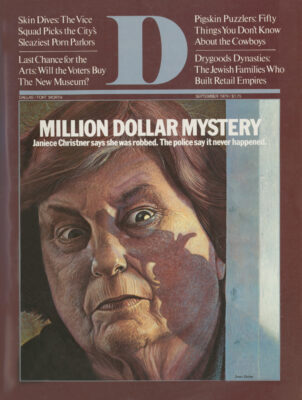Talk among local arts groups last month was that if the Dallas Symphony Orchestra managed to get on the ballot for the November 6 bond election it would be because of clout. Well, the DSO is now on, and clout is spelled Decherd.
Robert Decherd, Dealey heir and current vice president for corporate administration of Belo Corporation, became head of the Symphony Association in May, when the orchestra’s political future looked about as promising as the pennant chances of the Toronto Blue Jays. At that point most of the energy was going into recruiting a new managing director for the orchestra and raising funds to cover its $4-million-plus annual operating budget. Nothing had been done to prepare for the crucial bond election.
Recognizing how far behind the DSO was, Decherd shifted into high gear. In a few short weeks he managed to raise $750,000 as the symphony’s share towards a downtown site plus an additional $1.5 million for architectural design and site planning. Some of this money had been available last year but a sizeable portion was the direct result of Decherd’s dunning. He also helped put together a steering committee, headed by Stanley Marcus, to run the symphony’s campaign, and hired top public relations man Julian Read of Read-Poland. While still nowhere near as well organized as the Dallas Museum of Fine Arts, the symphony is now at least in the game.
Besides organizational ability, Decherd has brought a good deal of political savvy to the symphony. Before his arrival, there was strong opposition to putting the DSO on the ballot for the simple reason that it hadn’t done its homework. The DMFA was offering the city $12 million in cash ,$15 million in art, and $5 million more for an operating endowment while the symphony was offering an empty hat. Several council members suggested that, as a sign of good faith, the symphony should raise $3 million for land on its own, for which the city would then give DSO credit on an ’80 or ’81 bond issue. Decherd successfully argued that this would place too much pressure on the symphony. Backers would be asked to pledge large sums of money with no firm commitment from the city that the funds would have effect on the ultimate construction of a concert hall. “We might raise $4 million and still walk into a negative environment,” Decherd said.
Even more persuasive was the DSO’s argument that, if it didn’t get on the ballot the arts district concept was dead. Private developers had already purchased two of the three choice sites downtown: If the symphony lost the third one, then it just might have to move to North Dallas, where Ross Perot and other supporters could provide a suitable home. Not only would the city be unable to accept a gift of land in North Dallas, hardly socially neutral ground, but the council would be faced with an annual free-for-all when the DSO’s public subsidy came up for a vote. That possibility was sufficiently unappealing to convince eight council members to vote to include the symphony on the November ballot.
Should the bond election fail, Decherd and the symphony will surely be fingered as villains for helping to overload the ballot. But that’s a risk Decherd’s willing to take. So far, he’s batting a thousand.
Related Articles

Restaurants & Bars
Where to Find the Best Italian Food in Dallas
From the Tuscan countryside to New York-inspired red sauce joints, we recommend the best of every variety of Italian food available in North Texas.

Hockey
The Stars and Golden Knights Meet Again
Catching the Stanley Cup champs early might work out for the Stars.
By Sean Shapiro

Basketball
Previewing Yet Another Mavs-Clippers Playoff Matchup
What is different about Clippers-Mavericks this time around? Kyrie and D.
By Iztok Franko


